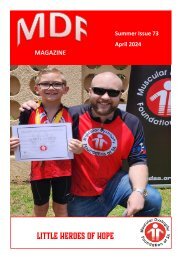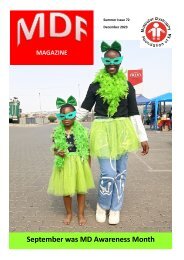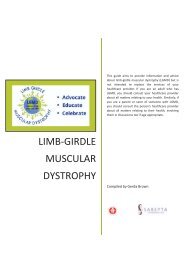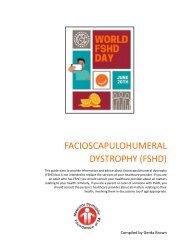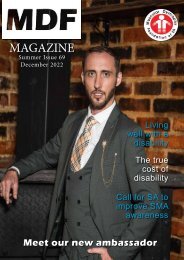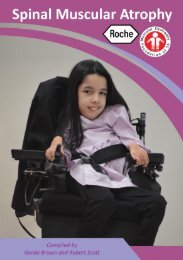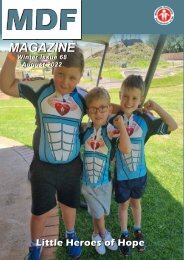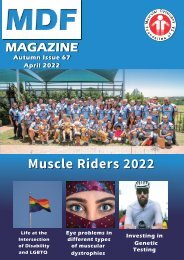MDF Magazine Issue 64 April 2021
You also want an ePaper? Increase the reach of your titles
YUMPU automatically turns print PDFs into web optimized ePapers that Google loves.
Healthy Living
MEDITATION AND
NEUROMUSCULAR
DISEASE
BY THE MUSCULAR DYSTROPHY ASSOCIATION
PUBLISHED ONLINE JANUARY 7, 2021
Living with neuromuscular disease (NMD) involves specific
challenges — some physical, some strategic, some
structural — that can create stress and contribute to
changes in both physical and mental health. Can meditation,
mindfulness, and other relaxation practices help?
Yes, says Paige Lembeck, PhD, a pediatric psychologist
and assistant professor of Clinical Child Psychology at
the Yale Child Study Center in New Haven, Conn. Paige
treats people who experience chronic headaches, muscular
dystrophy, and other neurological conditions. Here,
she sheds more light on how meditation can make a
difference.
Can meditation help in specific ways with the management
of neuromuscular disease?
Absolutely. Tons of evidence proves that meditation
changes a person’s physical state, and these interventions
are commonly used to help people with all sorts
of physical symptoms, such as chronic pain. We have
learned that relaxation and reduced stress can promote
healing and reduce inflammation in the body, which is
consistent with what we know about the “mind‒body”
connection being very real. Research shows that meditation,
mindfulness, and similar stress-reduction techniques
can especially help with cardiac and respiratory
health. If people feel more comfortable and less anxious
with the help of meditation and mindfulness, they are
also likely to cope more effectively with procedures, hospitalizations,
and other aspects of treatment for NMD.
Overall, there is a mountain of evidence showing that
supporting one’s psychological health can also lead to
more positive physical health outcomes.
How does one know if meditation is right for them?
Meditation, just like drinking water or getting a restful
night’s sleep, is something that is beneficial for everyone.
Having said that, the best way for someone to know if
meditation is a good fit is to try it out! Like any new skill,
such as learning to read or playing a new video game, it
is best to practice it regularly for brief periods of time (it
really does take practice to do it well!). At first, it is best
to practice during non-stressful times to build fluency in
using the skill before applying it in times of higher stress.
A patient, persistent approach is better than simply trying
it just once and then dismissing it as ineffective. I encourage
those who are new to meditation to think about their
own schedule and to see when it might make sense to
fit it into their routine. For example, many people like
47




